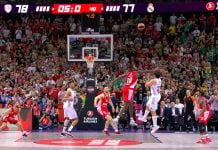With Panathinaikos easily beating Galatasaray at home (85-58) to return to the winning track, are the “Greens” able to build a crucial winning streak in the Euroleague?
After a summer that saw many changes take place in the active roster, the season didn’t start well for the team. The painful defeat to Olympiacos in Piraeus (88-63) put an end to coach Argiris Pedoulakis’ presence in the squad’s bench, with former Barcelona coach, Xavi Pascual, being appointed as his replacement.
The Catalan coach is still trying to impose his own playing style, however his players, who are very talented offensively, especially in 1-on-1 situations, are not ready yet to play effective and consistent basketball for more than 25 minutes.

Although they have certain advantages that allow them to be competitive in every game (good ball movement, well-organised tactics, experienced coach), they have some disadvantages that prevent them from being considered title contenders.
What we have seen until now is that the “Greens” usually make a great start to their games, which help them earn a significant advantage, but they cannot continue the same way and, consequently, they have to fight until the last minute to beat their opponents.
For example, eight of their 11 games so far (6-5 record) have been decided in the last minute (four wins, four losses) and what is clear is that the team needs a “clutch” player that can take the last shot when everything is on the line.
Dimitris Diamantidis was such a case, but he decided to retire a few months ago and no member of the current roster seems capable of replacing him.
What I also think is that if there was such a player in the roster, Panathinaikos would certainly have a better record in the Euroleague.
Of utmost importance is also the fact that there is no reliable backup in case Nick Calathes is not available to play.
The Greek-American point-guard (13.1 points, 4.4 rebounds and 6.6 assists per game) is the team’s leader, doing everything on the floor, however he plays more than 31 minutes in every game, which can be harmful for him, as the season goes on.
Neither Nikos Pappas (6.3 points per game) nor Mike James (7.3 points per game, having played only three times this season) can act as a point-guard, since both of them are shooting guards.
Moreover, with Lefteris Bochoridis (only 1.8 points in 4.7 minutes per game) not having much playing time and James Feldeine (7.4 points, 2.5 assists, 42.5% from range) having many ups and downs, the ideal solution for the club is either to acquire a player with similar characteristics to Calathes’ ones or (to) differentiate their game plan.
The latter is crucial for the team, as the 27-year-old guard doesn’t shoot the ball well from the three-point range (13/45, 28.9%) and the Greens’ opponents take advantage of it and prevent him from driving to the basket.

Another issue that Panathinaikos need to solve is their tendency to shoot many three-pointers (almost 25) in every game (98/278 overall, 35.3%), having missed most of them, though.
Although the team is consisted of players that can shoot the ball very well from the three-point range (Antonis Fotsis, K.C Rivers, Giannis Bourousis, Mike James, Chris Singleton), this doesn’t mean they should only focus on that aspect of the game and not on scoring inside the paint.
Maybe, this happens because Bourousis is not in the ideal playing style right now (8.5 points, 5.3 rebounds, with only 43.4% in two-pointers) and cannot yet become a reference point for the team.
Concurrently, no other member of the team’s front-line (Fotsis, Singleton, Kenny Gabriel, Demetris Nichols and injured James Gist) can easily score points inside the paint, so they prefer to shoot from mid or the three-point range.
Moreover, the squad needs to enhance their concentration in order to grab more rebounds in every game, especially offensively, as they currently are only tenth in that category, with 9.73 offensive rebounds per game, with Anadolu Efes on top (15.09).
It’s worth mentioning, though, that Gist’s absence, due to injury, has significantly affected the team, as the American power forward was grabbing almost five total rebounds per game.
But, as the “Greens” are still trying to play better game after game and enhance their co-operation, I guess they will further improve in that category, as the season goes on.
Against Galatasaray, they played very well for 30 minutes, so they should now stabilise their performance at high levels, with many crucial matches taking place in December and January.
The “Greens” are set to face the likes of Baskonia, Olympiacos, Fenerbahce (twice) and Anadolu Efes, among others, so they need to raise their level of cohesion and concentration, on both ends of the floor, in order to cope with their difficult schedule.
Although it certainly is normal for the squad to face many ups and downs in that part of the season, due to the acquisition of many good players during the summer, they should diminish them in order to avoid any major upsets that can negatively affect their presence in the Euroleague.
Their performance against Galatasaray was the first step in their effort to climb higher in the standings and a sign that they will be even better in the next months, if they continue that way.
For now, what matters the most for Panathinaikos is to keep on working and deal with their disadvantages, proving that the game against the Turkish club can become the turning point for the Greens’ return to the top.

















